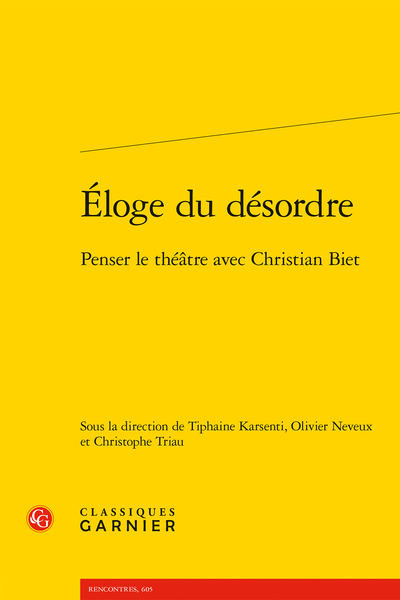
Christian Biet, Still With Us
- Type de publication : Article de collectif
- Collectif : Éloge du désordre. Penser le théâtre avec Christian Biet
- Auteur : Schechner (Richard)
- Résumé : Un bref portrait de Christian Biet comme homme par excellence présent parmi les autres, passeur transatlantique et penseur interculturel et cosmopolite.
- Pages : 11 à 12
- Collection : Rencontres, n° 605
- Série : Études théâtrales, n° 5
- Thème CLIL : 4028 -- SCIENCES HUMAINES ET SOCIALES, LETTRES -- Lettres et Sciences du langage -- Lettres -- Etudes de littérature comparée
- EAN : 9782406158103
- ISBN : 978-2-406-15810-3
- ISSN : 2261-1851
- DOI : 10.48611/isbn.978-2-406-15810-3.p.0011
- Éditeur : Classiques Garnier
- Mise en ligne : 10/01/2024
- Langue : Anglais
- Mots-clés : Théâtre, performance, interculturalité, théâtre américain, contemporain
Christian Biet, Still With Us
Christian Biet would speed on his moto everywhere, and that finally, horribly, is what killed him. He wanted to participate as fully as he could in whatever was important. Whether it was at a café, in a meeting of colleagues, with students at Nanterre or New York University – Christian was there, here, among us. But he also was present in his writings, his editing, his organizing, his emails, his effects on students, artists, scholars, and others. Although he could be touchingly intimate, he was also public, as his dedication to Théâtre Public so clearly shows. To imagine him gone, no, it is an idea I cannot hold in my mind.
How did I meet Christian? He was Hermes, a messenger and connector; and Zeus, a creator. Did I run into him by means of a mutual such as Judith Miller? Or maybe through Tom Bishop, another longtime champion of theatre at NYU? Perhaps it was Marie Pecorari and Anne Cuisset who worked with Christian on bringing some of my writings into french in Performance Expérimentation et théorie du théâtre aux USA?Maybe all of these – because that’s the kind of ubiquity characterizing Christian. I know that over time, Christian and I saw each other whenever we could – when I came to France or he to the USA, both of which were often. What I remember most affectionately are times he opened to me his plans and invited me to collaborate. Which I gladly did. Early in life, while still a graduate student in the 1961-1962 academic year, I lived in Paris researching my dissertation on « Aspects of the theatre of Eugène Ionesco ». I lived on Rue Dauphine, spent a lot of time at the Bibliothèque de l’Arsenal, and saw productions of Jean Vilar at the TNP and Jean-Louis Barrault as Bérenger in Rhinocéros. I interviewed Ionesco several times and got to know Bernard Frechtman, Genet’s translator into English. Knowing Christian and working with him and his colleagues is the other side of this bridge made of time.
Indeed, Christian was trans-Atlantic, french, and global simultaneously. The very way he lived his life with intensity and exuberance, 12and the dedication he had for building bridges and using networks were absolutely right for a world increasingly dependent on communication and contact (even with, and to some degree because of, the coronavirus). Christian took to this world of intercultural citizenship. He celebrated his french cultural roots while living amidst the branches and foliage of a vibrant world culture tree. Maybe this ardent cosmopolitanism helps explain why he was such a fine teacher.
To end where I began: Christian Biet moving through the world. His awful – dare I say, stupid – death, a death without warning or tragic justice, leaves us all – those who knew Christian personally and those whom his accomplishments touch – aghast. But maybe there is some comfort in knowing that although Christian as an individual is gone, his substance and essence, his extraordinary good works, circulate among us. They will continue to do so as a force in the world at large and as a particular guide to those many he touched.
Richard Schechner
New York, January 2022